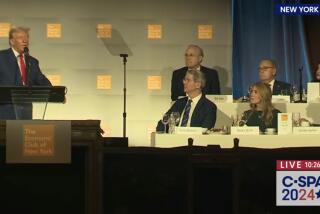GOP Wants ‘Education IRAs’ Expanded
- Share via
WASHINGTON — The main budget battle may be over, but GOP congressional leaders declared Friday that, for a rejected plan to help parents cover private school costs, the war is only beginning.
House Speaker Newt Gingrich (R-Ga.) and Senate Majority Leader Trent Lott (R-Miss.) blamed President Clinton for derailing a proposal to let parents save money in tax-sheltered accounts for elementary and secondary school expenses.
Gingrich and Lott vowed to help the proposal’s author, Sen. Paul Coverdell (R-Ga.), resuscitate the tax break when Congress returns next month from its summer recess.
“I want Americans to get a good, safe, quality education and to have some choices,” Lott said. “Children just aren’t getting the basics, and they aren’t safe.”
The sweeping budget legislation approved by Congress this week and sent to Clinton for his signature does authorize a new kind of tax-sheltered savings account, called an “Education IRA.”
Beginning in 1998, parents will be allowed to contribute up to $500 annually to such accounts for college costs. Interest will accumulate tax-free, and the balance will not be taxed upon withdrawal. But the money cannot be used for elementary or secondary education expenses, including private school tuition.
Coverdell proposed an amendment to the budget bill to let parents use the Education IRAs to pay for private and parochial school tuition and related costs. But despite Republican support for the proposal, Clinton won a last-ditch effort to keep the amendment off the budget bill.
In a letter to Republican leaders, Clinton said he would veto the entire bill if the amendment were included.
Clinton said his opposition to Coverdell’s proposal reflected concern that public schools may lose students and funds if parents are rewarded for providing a private school education for their children.
Republicans, however, said the proposal was mainly aimed at providing parents with the opportunity to send their children to safer and better schools. They accused Clinton of reneging on his promise to help middle-income families.
“He cast his lot with the status quo, and by doing so, he turns his back on . . . elementary and high school education,” said Coverdell.
White House spokesman Barry Toiv said Clinton opposed the amendment to keep limited resources in the hands of elementary and secondary public schools.
“The president always opposes using federal resources to support private and parochial schools in a way that would undermine public education,” Toiv said.
House Majority Leader Dick Armey (R-Texas) said Clinton’s reluctance to support the Coverdell measure reflects the political clout of the National Education Assn.
“If the president wants his children and all children in America to learn to read by 8 years old, he must see that children must learn all the letters of the alphabet, not just NEA,” Armey said.
More to Read
Get the L.A. Times Politics newsletter
Deeply reported insights into legislation, politics and policy from Sacramento, Washington and beyond. In your inbox three times per week.
You may occasionally receive promotional content from the Los Angeles Times.










